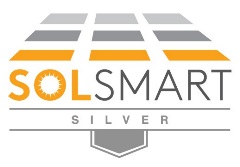
Solar Energy
The generation of carbon-free solar energy offsets harmful GHG emissions produced by standard methods of electricity production. A home that transitions to 100% solar energy could reduce monthly CO2 emissions by 765 pounds per month. Not only is solar
energy better for the environment, it also increases property values. A study completed by Lawrence Berkeley National Laboratory found, on average, solar energy infrastructure increased the value of a home by about $15,000. Repayment on investment in solar panels, resulting from long-run energy bill savings, for a single family home is typically 10-15 years. 
La Crosse County supports expanded use of solar energy to reduce the carbon footprint produced by the County’s current energy consumption. La Crosse County achieved a SolSmart Silver Certification by completing steps to improve the efficiency and accessibility of solar permitting in unincorporated areas of the county.
199 solar permits have been issued in La Crosse County since 2019.
If you are evaluating adding solar energy to your property, consider reviewing the resources below.
Summary of Solar Permitting Process:
Residents of the Town of Barre, Town of Bangor, Town of Farmington, Town of Greenfield, Town of Hamilton, Town of Holland, Town of Medary, Town of Onalaska, Town of Shelby, and Town of Washington may construct residential solar energy facilities by following the steps below:
- Solar Power Buying Tips Fact Sheet (Wisconsin.Gov) Review these valuable tips for navigating the installation process with solar providers and contractors. We recommend reading this fact sheet before continuing.
- Consider visiting EnergySage where you can compare rates from various solar installers in the region and explore additional energy savings options.
- Submit Zoning/Occupancy permit application either in person or online.
- Zoning/Occupancy Permit application link
- Include a site plan showing locations and dimensions of proposed panels; if detached, include dimensions of proposed panels’ distance to nearest property lines and/or structures.
- Receive confirmation email from Zoning staff that includes permit project number & link to pay permit fee ($125.00 residential use, $425.00 commercial use).
- If proposed panels are detached/ground-mounted, the applicant must contact the Land Conservation Dept. to determine if Erosion Control Permit is required for construction.
- If property located within the Airport Buffer, an Airport Permit may be needed from the City of La Crosse.
- Once permit fees are paid, Zoning staff processes the permit and follow-up with the applicant when the permit is ready for signature.
- Once permit is signed by the applicant, Zoning staff signs and returns final copies of permit; one for the Town and one for the applicant, along with a placard to post while construction takes place.
- The applicant must reach out to the appropriate Township to see if additional town permits are required.
- If no town permits are required or if all applicable town permits are approved, construction may begin.
To discuss powering your property with solar energy, contact: [email protected]
Solar Financing, Incentives, and Tax Exemption Resources:
For Residential and Business:
- Xcel Energy
- For more information on utility interconnection (net-metering) or other utility-specific resources or regulations, visit Renewable Energy | Xcel Energy
- Solar Energy System Property Tax Exemption
- Installing a solar energy system has been shown to increase property values. In Wisconsin, solar energy systems are exempt from property tax. This means that your property taxes won’t increase due to solar installation and use.
- Renewable Energy State Sales Tax Exemption
- Solar energy systems are automatically sales tax exempt in Wisconsin. No rebate process is required.
- Focus on Energy Incentives
- Eligible homeowners can get a $500 rebate on the purchase and installation of new Solar Energy Systems.
- Rural residential customers can receive an additional $500 for installing a solar energy system. Eligible zip codes can be found here.
- Click here to find out your eligibility and how to apply.
- Federal Inflation Reduction Act (IRA)
- Qualified homeowners are eligible for a nonrefundable tax credit up to 30% of the total cost of the solar energy system.
- To claim the Solar Panel Tax Credit, or Investment Tax Credit (ITC), all you must do is fill out the IRS form 5695 “Residential Energy Credits” and include your results on your IRS Form 1040.
- This nonrefundable credit is only available until 2034 but is retroactive for solar energy systems installed after January 1st, 2022.
- For more in-depth instructions on how to claim this credit, click here.
For Business:
- PACE Wisconsin - Low-cost, long-term loans for renewable energy
Consumer Protections, Solar Rights, and Procedures:
Several Wisconsin laws address a homeowner’s right to install solar energy systems:
- Under Wisconsin Statutes s. 66.401(1m), “No political subdivision may place any restriction, either directly or in effect, on the installation or use of a wind energy system that is more restrictive than the rules promulgated by the commission under s. 196.378 (4g) (b). No political subdivision may place any restriction, either directly or in effect, on the installation or use of a solar energy system, as defined in s. 13.48 (2) (h) 1. g., or a wind energy system, unless the restriction satisfies one of the following conditions:
- Serves to preserve or protect the public health or safety.
- Does not significantly increase the cost of the system or significantly decrease its efficiency.
- Allows for an alternative system of comparable cost and efficiency.”
- Under state statute 236.292(2), “All restrictions on platted land that prevent or unduly restrict the construction and operation of solar energy systems, as defined in s. 13.48 (2) (h) 1. g., or a wind energy system, as defined in s. 66.0403 (1) (m), are void.”
La Crosse County cannot offer legal advice to HOAs, solar installers, or homeowners.
To better understand these statutes, we suggest the following resources:
- Grow Solar Toolkit authored by the Great Plains Institute.
- North Carolina Clean Energy Technology Center’s database of clean energy information, which includes state-level information, summarizes Wisconsin statutes.
Solar Mapping & Production Value Resources:
To consider how much solar energy could be generated on your property, explore these resources:
Recent solar installations permitted:
2019 – 9 roof-mounted, 5 ground-mounted
2020 – 14 roof-mounted, 8 ground-mounted
2021 – 40 roof-mounted, 14 ground-mounted
2022 – 45 roof-mounted, 22 ground-mounted
2023 (as of 4/21/23) – 19 roof-mounted, 5 ground-mounted
County Buildings with Solar Arrays (Anticipated by 2024):
- Lakeview Health Center, West Salem
- Highway Shop, West Salem
- Law Enforcement Center, La Crosse
- Administrative Center, La Crosse
- Health and Human Services Building, La Crosse
- Goose Island Campground, La Crosse County

